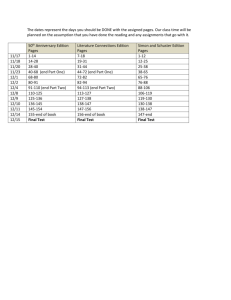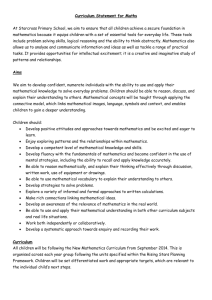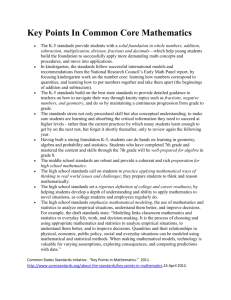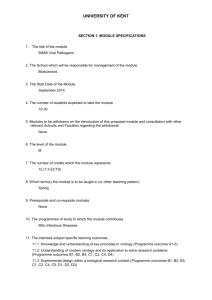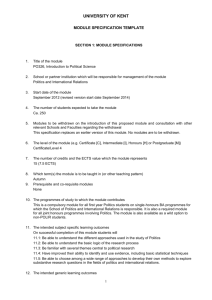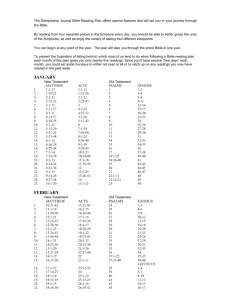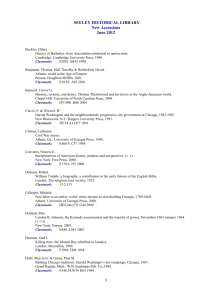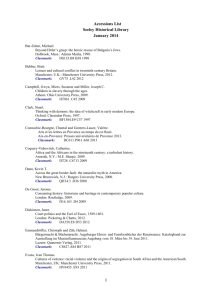Theory of Games - University of Kent
advertisement
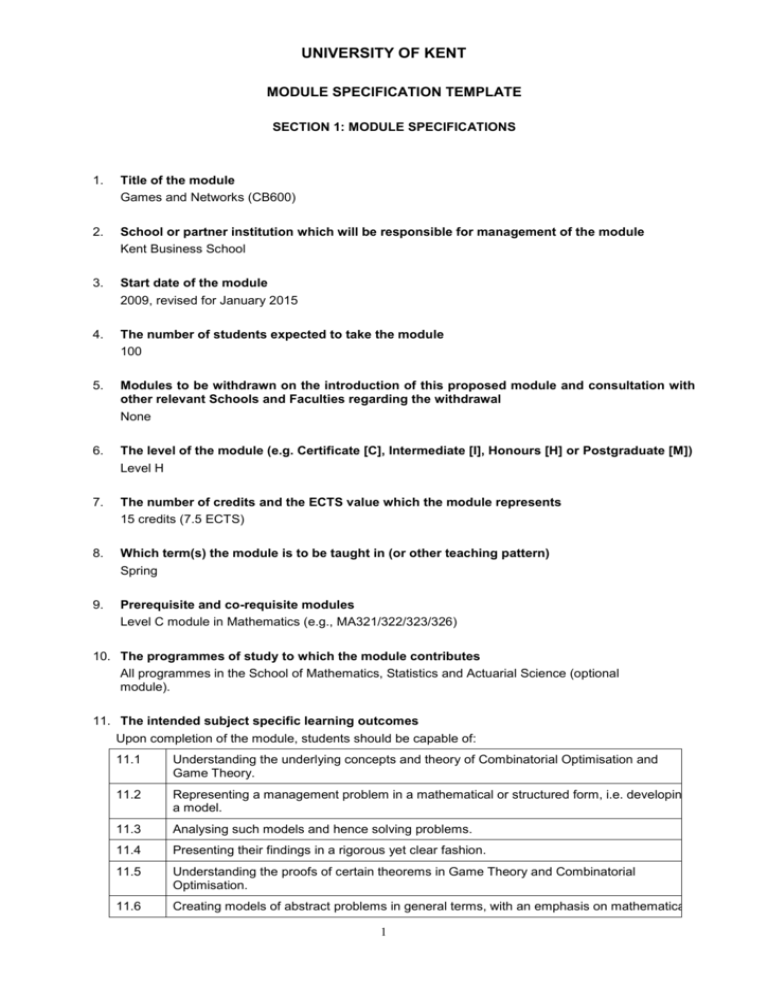
UNIVERSITY OF KENT MODULE SPECIFICATION TEMPLATE SECTION 1: MODULE SPECIFICATIONS 1. Title of the module Games and Networks (CB600) 2. School or partner institution which will be responsible for management of the module Kent Business School 3. Start date of the module 2009, revised for January 2015 4. The number of students expected to take the module 100 5. Modules to be withdrawn on the introduction of this proposed module and consultation with other relevant Schools and Faculties regarding the withdrawal None 6. The level of the module (e.g. Certificate [C], Intermediate [I], Honours [H] or Postgraduate [M]) Level H 7. The number of credits and the ECTS value which the module represents 15 credits (7.5 ECTS) 8. Which term(s) the module is to be taught in (or other teaching pattern) Spring 9. Prerequisite and co-requisite modules Level C module in Mathematics (e.g., MA321/322/323/326) 10. The programmes of study to which the module contributes All programmes in the School of Mathematics, Statistics and Actuarial Science (optional module). 11. The intended subject specific learning outcomes Upon completion of the module, students should be capable of: 11.1 Understanding the underlying concepts and theory of Combinatorial Optimisation and Game Theory. 11.2 Representing a management problem in a mathematical or structured form, i.e. developing a model. 11.3 Analysing such models and hence solving problems. 11.4 Presenting their findings in a rigorous yet clear fashion. 11.5 Understanding the proofs of certain theorems in Game Theory and Combinatorial Optimisation. 11.6 Creating models of abstract problems in general terms, with an emphasis on mathematical 1 UNIVERSITY OF KENT rigour. (Note that in particular 11.5 and 11.6 are set at the higher edge of what is expected at level H.) These learning outcomes contribute particularly to the BSc Mathematics programme outcomes of gaining knowledge and understanding of “the principles of … mathematical methods [and] discrete mathematics” (A1), “methods and techniques of mathematics” (A4) and “the role of logical mathematical argument and deductive reasoning” (A5); moreover to acquiring an ability to “demonstrate knowledge of key mathematical concepts and topics, both explicitly and by applying them to the solution of problems” (C1), “comprehend problems, abstract the essentials of problems and formulate them mathematically and in symbolic form so as to facilitate their analysis and solution” (C2) and “present their mathematical arguments and the conclusions from them with clarity and accuracy” (C4). (Related SMSAS programmes have similar learning outcomes.) 12. The intended generic learning outcomes Upon completion of the module, students will have gained the ability to: 12.1 Demonstrate a reasonable understanding of Mathematics. 12.2 Demonstrate skill in calculation and manipulation of the material. 12.3 Apply a range of concepts and principles in various contexts. 12.4 Use logical argument. 12.5 Demonstrate skill in solving mathematical problems by various appropriate methods. (These correspond to Mathematics programme learning outcomes B1–B5.) Moreover, students will have developed the following transferable skills: 12.6 Problem-solving skills, relating to qualitative and quantitative information. 12.7 Communications skills. 12.8 Numeracy and computational skills. 12.9 Time-management and organisational skills. (These correspond to Mathematics programme learning outcomes D1–D3 and D6.) 13. A synopsis of the curriculum The module is divided into two main topics, namely Combinatorial Optimisation, and Game Theory. A more detailed listing of content is given below. Combinatorial Optimisation The Shortest Path Problem The Minimal Spanning Tree Problem Flows in Networks Scheduling Theory Computational Complexity Theory of Games Matrix Games – Pure Strategies Matrix Games – Mixed Strategies Bimatrix Games N-person Games Multi-criteria Decision Theory 14. Indicative Reading List Winston, W.L. (2003). Operations Research: Applications and Algorithms. Andover: Cengage. Classmark T 57.6 (Recommended Text; we shall follow it closely) Taha, H. (2011). Operations Research: An Introduction. New York: Prentice-Hall. Classmark HD29 2 UNIVERSITY OF KENT Lawler, E.L. (1976) Combinatorial Optimization: Networks and Matroids. New York: Holt, Rinehart & Winston. Classmark QA402.5 15. Learning and Teaching Methods, including the nature and number of contact hours and the total study hours which will be expected of students, and how these relate to achievement of the intended module learning outcomes: The module comprises two lectures and one small-group seminar (tutorial) class per week. In addition, students would be expected to spend approximately two hours per week on theory and two on solving the numerical exercises in preparation for the tutorial classes. Furthermore, each assignment will take about 6-9 hours to complete. Altogether, students should normally devote about 12 hours per week to this module. In the lectures, new concepts are introduced, together with practical instructions and any requisite theory. Where possible, the theory will be demonstrated on examples. Each week students are given a set of exercises that they will work on at home and during the seminar classes. This module primarily develops the skills of modelling and problem-solving. These are central to all activities: lectures demonstrate how models are created and problems solved, whilst tutorial classes and homework assignments encourage and enable students to apply these skills themselves. Written communication skills are developed within the assignments where clear and coherent organisation of information is essential. The teaching methods, whereby instruction is followed by opportunities for students to apply the knowledge thus acquired, help attain the objectives of developing models, analysing them and communicating the results. Hours Subject LOs Generic Los Lectures 22 11.1-11.6 12.1-12.6, 12.8 Seminars 10 11.1-11.4 12.1-12.9 Independent study 118 11.1-11.6 12.1-12.9 Total hours 150 16. Assessment methods and how these relate to testing achievement of the intended module learning outcomes Weighting Subject LOs Generic LOs Examination -2 hour unseen 80% 11.1-11.6 12.1-12.9 Four equally weighted coursework assignments 20% 11.1-11.4 12.1-12.9 The module will be assessed 20% by four written assignments and 80% by examination. There will be two assignments for each topic. Both the assignments and the examination questions test the ability of students to formulate problems using appropriate models, solve these problems relying on their models and using appropriate techniques and communicate their results in a clear and precise fashion. Thus, the assessment methods employed contribute directly to testing achievement of the learning outcomes. The assignments are also formative assessments and contribute to students’ learning in much the same way as their seminar exercises: they provide students with an opportunity to apply their knowledge of problem-formulation and problemsolving. 17. Implications for learning resources, including staff, library, IT and space None 3 UNIVERSITY OF KENT 18. The School recognises and has embedded the expectations of current disability equality legislation, and supports students with a declared disability or special educational need in its teaching. Within this module we will make reasonable adjustments wherever necessary, including additional or substitute materials, teaching modes or assessment methods for students who have declared and discussed their learning support needs. Arrangements for students with declared disabilities will be made on an individual basis, in consultation with the University’s disability/dyslexia support service, and specialist support will be provided where needed. 19. Campus(es) where module will be delivered: Canterbury SECTION 2: MODULE IS PART OF A PROGRAMME OF STUDY IN A UNIVERSITY SCHOOL Statement by the School Director of Learning and Teaching: "I confirm I have been consulted on the above module proposal and have given advice on the correct procedures and required content of module proposals" ................................................................ .............................................. Director of Learning and Teaching Date ………………………………………………… Print Name Statement by the Head of School: "I confirm that the School has approved the introduction of the module and, where the module is proposed by School staff, will be responsible for its resourcing" ................................................................. .............................................. Head of School Date ……………………………………………………. Print Name Module Specification Template Last updated February 2013 4




